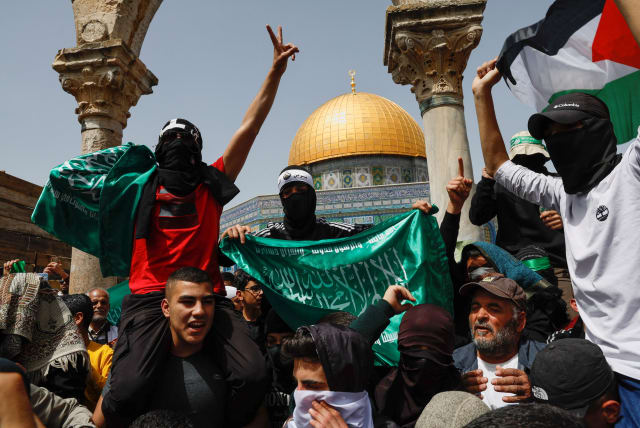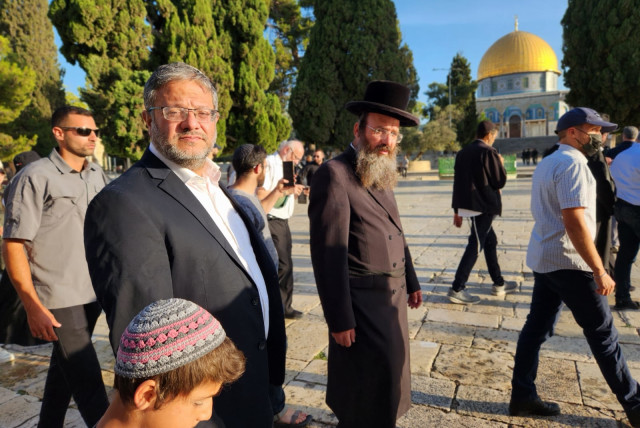Why Ramadan at al-Aqsa is an annual flashpoint of violence - explainer

Tensions rise in Jerusalem ahead of Ramadan over Al-Aqsa Mosque access limits advised by Ben Gvir, sparking fears of unrest.
As the Islamic holy month of Ramadan approaches, tensions are escalating in Jerusalem, particularly around Al-Aqsa Mosque compound, a site of profound religious significance to both Muslims and Jews. Israeli Prime Minister Benjamin Netanyahu’s recent announcement of access restrictions to the compound during Ramadan—a move recommended by Israeli far-right National Security Minister Itamar Ben Gvir—ignited concerns of potential unrest, both the country’s internal security agency, Shin Bet, and retired Israeli officials.
Al-Aqsa Compound
Located in east Jerusalem’s Old City, Al-Aqsa Mosque compound, known to Muslims as Haram al-Sharif (the Noble Sanctuary) and to Jews as the Temple Mount, is a focal point of religious devotion and national identity. For Muslims, it is the third holiest site in Islam, while Jews revere it as the location of the two ancient Jewish temples, making it the holiest site in Judaism.
The compound has been administered as a waqf, a property dedicated for Muslim religious or charitable purposes, since Saladin's reconquest of Jerusalem from the Crusaders in 1187. The compound has been managed by a Jordanian-appointed Jerusalem Waqf and Al-Aqsa Mosque Affairs Department since 1948, when Jordan took control of east Jerusalem during Israel's War of Independence. This arrangement continued even after Israel conquered and annexed east Jerusalem in 1967, though Israel controls access to the compound.

Recent years have seen annual flashpoints during Ramadan, with clashes between Palestinian worshippers and Israeli police. Incursions by Jewish nationalist groups and restrictions on Palestinian access have only exacerbated tensions.
The concept of the “status quo”—an understanding of the management and access to the site that dates to the 19th-century Ottoman Empire—remains a key principle in discussions about the compound. Efforts to maintain or alter this status quo are closely watched by the international community, and changes are often met with significant diplomatic and sometimes violent responses.
Ramadan
Ramadan, the ninth month of the Islamic lunar calendar, is a period of fasting, prayer, reflection, and community, observed by millions of Muslims around the globe who believe it was during this holy month that the Quran—Islam’s sacred text—was revealed to the Prophet Muhammad.
Each year, Ramadan transforms Jerusalem’s Old City. The narrow alleys and ancient stones resonate with the sounds of evening prayers (Tarawih) and the pre-dawn meal (Suhur) as worshippers gather in large numbers at Al-Aqsa. With its vast courtyard and iconic structures, the mosque compound becomes a focal point for Palestinian religious life and identity. Ramadan is not only a time for physical abstention from dawn until sunset but also a time for spiritual rejuvenation and increased devotion.
This means that any perceived threats to Al-Aqsa Mosque compound during this period are particularly inflammatory. Previous years have witnessed violence triggered by actions at Al-Aqsa spilling over into broader Israeli-Palestinian conflicts. The current context, with the ongoing war in Gaza and the proposed restrictions, sets the stage for a potentially volatile Ramadan in Jerusalem. Al-Aqsa is not just a place of worship but a symbol of faith and resistance for Palestinians, making access to it during Ramadan a highly sensitive issue.
In April 2023, violent confrontations erupted at Al-Aqsa Mosque compound following Ramadan evening prayers as Palestinians barricaded themselves inside the mosque amid fears of religious provocations. Israeli police, responding in riot gear, injured 50 and arrested at least 400 individuals. In response, armed Palestinian groups launched rockets into Israel from Gaza and Lebanon, marking a pronounced flareup in the Israeli-Palestinian conflict. The unrest coincided with overlapping religious observances: Ramadan, Passover, and Holy Week, amplifying tensions.
Similar clashes between Palestinians and Israeli security forces erupted during Ramadan in 2022, resulting in the injury of around 160 Palestinians and the arrest of 400. In 2021, violence at Al-Aqsa Mosque compound during Ramadan helped set off a two-week mini-war between Israel and Palestinian forces in the Gaza Strip, as well as clashes in the West Bank and on the Israel-Lebanon border and riots in mixed Jewish-Arab cities across Israel. Restrictions on access to Al-Aqsa Mosque compound during Ramadan in 2009 paved the way for violence a few weeks later.
Israeli authorities argue that restrictions are necessary for security reasons, especially given the volatile history of clashes at the compound. However, Palestinians view these measures as part of a wider strategy to alter the status quo and erode their presence in the city. The tension between ensuring security and respecting the religious and national aspirations of Palestinians is a recurrent theme, making Ramadan a period of heightened vigilance and potential conflict.
